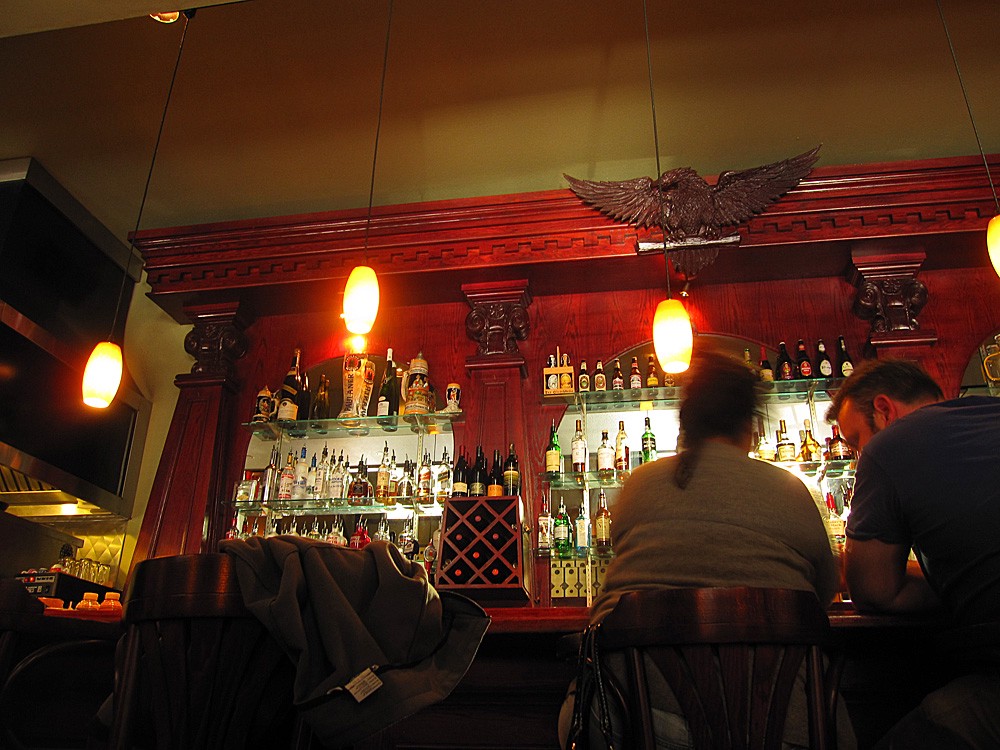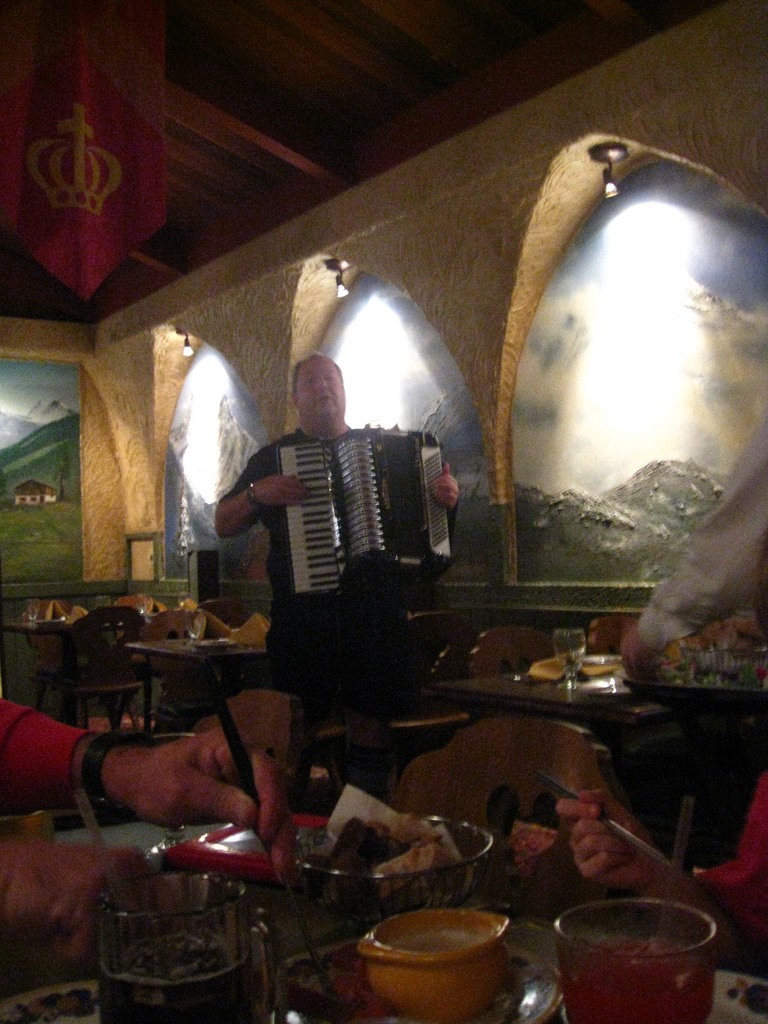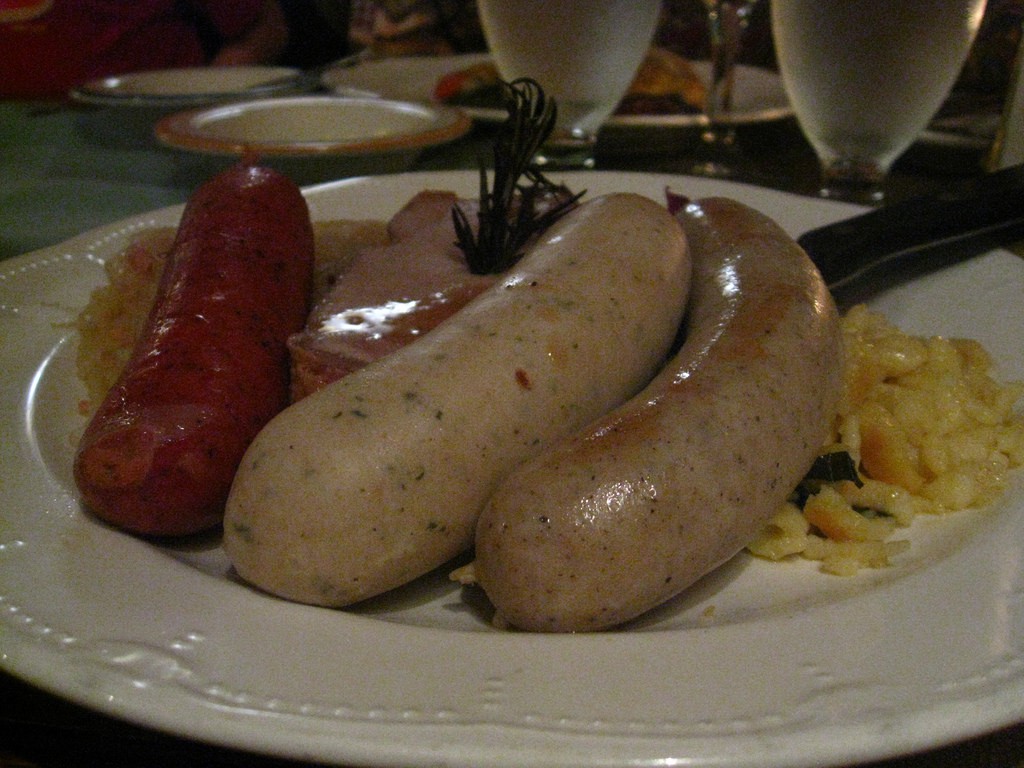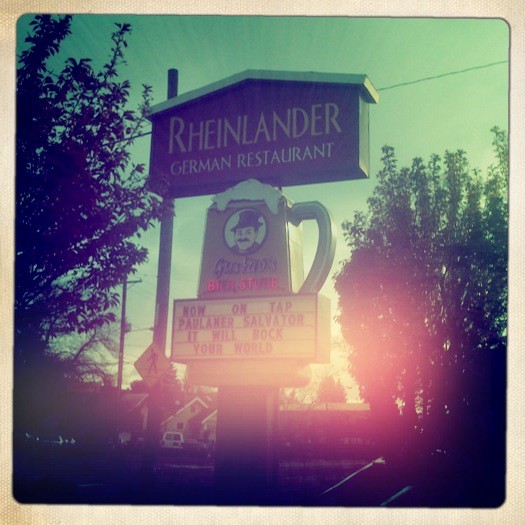Beer, Brats, and Bündhosen
The last nights of Der Rheinlander, Portland’s oldest German restaurant.

When one middle-aged customer ordered Der Rheinlander’s small beer, the bartender set a tanker of Ayinger Celebrator in front of him. “That’s our smallest,” he said with a smile. This guy didn’t mind. It was Wednesday night; he’d come to Portland, Oregon’s oldest German restaurant to drink and eat sausages and sing with the wandering accordion players wearing bundhosen. Also, to say goodbye. Open since 1963, Der Rheinlander was closing in ten days.
At 7:15 p.m., there was a forty-five minute wait to eat at Gustav’s, the attached bar. The Rheinlander side was all reserved. “All reserved?” asked an irritated-sounding woman leaning over the front desk. “All reserved,” the young hostess said. She wore a long black ponytail and a high black choker. If you wanted to sit, you had to find a stool at Gustav’s. A crowd filled the vestibule, nearly blocking the front door. Customers leaned against the walls staring at their phones, listening for staff to call their names. Outside, a chilly December fog laid frost on car windshields, and the Rheinlander sign on Sandy Boulevard advised passersby “BOOK NY RESERVATIONS 2DAY.” In early 2017, Venerable Properties LLC will demolish the building to erect a health care clinic.
Portland is a food Mecca, where chefs survey new culinary frontiers and pioneer experimental business models, yet increasingly few artifacts from its less glamorous past remain. The cozy wood-lined Lotus Cardroom and Cafe downtown closed after ninety-two years in business. Veritable Quandary, serving Northwest cuisine in an old brick building near the river, closed after forty-five years. Founded by Portland’s “first celebrity chef,” Horst Mager, who dined with Julia Child and started what became Le Cordon Bleu College of Culinary Arts, Rheindlander was an institution.
Like many such local mainstays, developers would replace Der Rheinlander’s oddity and charm with something more lucrative, while slick t-shirts and bumper-stickers marketed Portland’s old oddity and charm. But the developers weren’t all bad. Venerable Properties LLC had turned the vacant Washington High School into an 850-seat concert venue and renovated the gorgeous 1907 White Stag Building downtown as University of Oregon’s Portland headquarters. Rheinlander’s replacement would provide patients everything from cardiology to behavioral health services.

As families ate in blue booths beneath hanging circular German crests emblazoned with eagles and griffins, five house musicians filed in caroling “And God bless you and send you a Happy New Year!” One singer wore a heavy red and green dress of faintly alpine provenance. The bald accordion player sweated profusely, even in short-shorts and lederhosen. A woman sawed into her schnitzel.
Rheinlander’s interior was a maze of separate dining rooms. Each had a theme: medieval church, small German gasthaus inn, cramped Bavarian closet. People packed every one. Inside the loud, reddish, main dining room, the same band now crowded a table of eleven, singing “Stille Nacht.” Three diners were in full Oktoberfest dirndl dress. Servers rushed past with trays of beer, and customers waiting for tables out front had migrated back in to film the festivities. One told her friend, “Okay, I have to find a bathroom in this place. Where are we?” The accordion player yelled, “Now in English!”
The castle Rheinlander was composed of three separate unsalvageable buildings anyway, seasoned and fused like weisswurst inside an unnatural casing of tan plaster and bluish paint. The aesthetic mixed a 1960s visions of the old country with the flair of a miniature golf park. Stained glass, a turret, second-story windows for rooms that didn’t exist — all identified the place as Germanic but didn’t hint at the high quality of its homemade boar sausage and sauerbraten. (Indeed, their famous fondue is Swiss.) And the Portland restaurants Prost! and Stammtisch had more “authentic” German sausages and sauerbraten, but sometimes dinner demands ambience over authenticity. Nü Portland’s chic white subway tile and Edison bulb aesthetic couldn’t compete with Bavarian camp. Yes, Rheinlander’s food was rich, but the festive, unapologetic kitsch felt as comfortable as your grandma’s house.

When a silver-haired man in a mauve shirt and beige slacks entered the reddish room, customers left their tables to pose for photos with him.
“I was looking for you,” one brunette said. “I came hopin’ I’d see you.” She lived in Milwaukie, twenty minutes away. A waitress pushed past holding two huge sausage plates. His name was Mira. Born in the former Czechoslovakia, he’d played accordion at Der Rheinlander for twenty years. The woman typed Mira’s contact information into her phone then kissed his cheek. “I love you,” she said. He patted her back, “I love you!” and they went their separate ways. At a computer terminal in a rear hall, Mira strapped his heavy silver instrument to his chest and adjusted the waist strap, then he clocked back in. “Time to play,” he said in a heavy accent. “Break is over.”
Diners could request songs. Accordionists played everything from yodeled folk tunes to the Spiderman theme. Not everyone appreciated it. “The musical performance impeded conversation,” said one Yelp reviewer who must have mistaken this for a Wienerschnitzel hot dog chain. By 7:45 p.m., the crowd up front had shrunk in half. Someone called in an order of mashed potatoes as a party of four swarmed the front desk, asking the cranky hostess about the wait. Boys in white shirts with dark ties hustled by. An elderly man dabbed food off his moustache. The middle-aged man at the bar ordered a Maßkrug, which holds one litre of beer, whatever a litre is. The phone kept ringing.

A smiling diner filmed Doug, the second, solitary accordion player. Doug played in a corner, staring at the carpet. At one point, he walked through the hall between rooms and opened an unseen hatch on the wall, stashing his keys inside and turning what appeared to be dials on the sound system. Under the carpet in that same hall, a set of stairs led to a secret cellar filled with what one server called “German crap.” “Crests, scrolls, plates,” he said, “you name it.” Customers walked over padlocked hatch without noticing. “It’s creepy,” the server said. The company would auction some of the cellar’s contents, keep a little and spread the rest to their three suburban Gustav’s locations. Rheinlander employees also had the option to transfer to other Gustav’s. Not everyone wanted to. This guy didn’t know where he wanted to work yet. Neither did one of the bartenders. First, they had to help dismantle Rheinlander’s interior and catalog all that crap.
The middle-aged man at the bar stared into his bier. Why drink Celebrator tonight, he thought? This was a funeral, but the accordion player’s joyful racket suggested otherwise. It seemed to say: Sing, dance, order the strudel. Man muss die Dinge nehmen, wie sie kommen, right? You must take things as they come. Everyone will live to sing “The Hofbräuhaus Song” again, even if it’s in the burbs. From inside these windowless rooms, the world’s one big Deutschland Disneyland anyway. As that old oom-pah song says, “And when the first beer mug is empty, the waitress Reserl soon brings you more,” and you count down, off-key and slurring, eins, zwei, g’suffa, before taking another drink.
